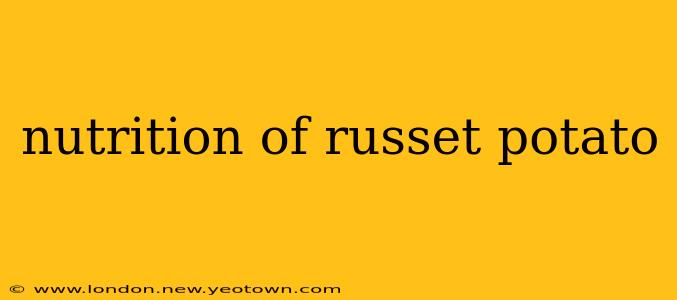The russet potato. A culinary staple, a comfort food classic, and often unfairly relegated to the side dish category. But beneath its earthy skin lies a nutritional profile far more impressive than many realize. This isn't just about fluffy mashed potatoes or crispy fries; it's about understanding the nutritional benefits of this readily available and versatile root vegetable.
Let's peel back the layers (literally and figuratively) to explore the surprising nutritional power of the humble russet potato.
What are the nutritional benefits of russet potatoes?
Russet potatoes are a surprisingly good source of several essential nutrients. One medium-sized russet potato (about 5.3 ounces or 150 grams) provides a significant amount of vitamin C, potassium, and fiber. Think of it as a tiny nutritional powerhouse packed with goodness that contributes to overall health and well-being. These nutrients are crucial for various bodily functions, from boosting immunity to maintaining healthy blood pressure.
What vitamins and minerals are in russet potatoes?
Beyond the already mentioned vitamin C and potassium, russet potatoes also contain smaller amounts of other essential vitamins and minerals, including vitamin B6, magnesium, and manganese. While the amounts might not be as substantial as those of vitamin C and potassium, they still contribute to a balanced nutritional intake. Remember that the nutritional content can slightly vary based on factors like growing conditions and soil composition.
How many calories are in a russet potato?
A medium-sized baked russet potato contains approximately 160 calories. It's important to note that this number can change significantly depending on how you prepare it. Adding butter, sour cream, cheese, or deep-frying drastically increases the calorie count. A simple baked potato, however, is a relatively low-calorie option, particularly when compared to many other side dishes or snack choices.
Are russet potatoes good for weight loss?
This is a question that often sparks debate. While a baked russet potato is relatively low in calories, its glycemic index (GI) is considered to be moderately high. This means it can cause a rapid spike in blood sugar levels. For individuals managing their weight or blood sugar, portion control and mindful preparation are key. Pairing the potato with protein and healthy fats can help moderate this glycemic response and promote satiety, potentially aiding in weight management.
Are russet potatoes healthy?
The healthfulness of russet potatoes hinges largely on how they're prepared. Baked, boiled, or steamed russet potatoes retain more of their nutrients and are considered healthier options than those fried or loaded with high-fat additions. In moderation, and prepared in a healthy way, russet potatoes can be a valuable part of a balanced diet.
How much potassium is in a russet potato?
A medium-sized russet potato contains a substantial amount of potassium – a vital mineral for maintaining healthy blood pressure. This makes it a beneficial food for individuals looking to support their cardiovascular health. It's always best to consult with a healthcare professional or registered dietitian for personalized advice on potassium intake.
The russet potato, often overlooked, reveals itself to be a valuable part of a healthy diet when prepared thoughtfully and consumed in moderation. Its nutritional content, while not a miracle cure, contributes positively to overall wellness. Remember to choose preparation methods that retain the nutrients and consider the impact on your blood sugar levels for optimal health benefits.

